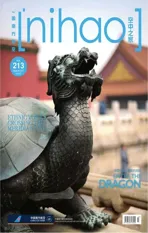Town Gala
2017-04-10GuoDan,ShiYu,LiaoJie
Town Gala
Text by Guo Dan Translation by Shi Yu Illustration by Liao Jie

It is a tradition that people go to the town gala on the night of the fi fth day of a lunar New Year, when people get to break all the taboos they have followed during the Spring Festival.
Every year I kept asking the performing crew to put on two Beijing Opera shows, The Hero and Beheading General Shan, and every year my old fellas kept telling me it would bring bad luck watching such a tragedy during a Spring Festival. Well, I didn't care about the “bad luck”, every year I would go ahead and request these two shows and I wept every time I watched them.
I liked The Hero particularly. It is a must for any classic town gala or big celebration during the period of the late Qing Dynasty. All of genres of the Laosheng (old male roles) and Qingyi (a faithful wife role, or a lover or maiden in distress) particularly like to put on this show. This story actually features two roles, a hero and a fair lady. As a matter of fact, this show would have different names depending on who is leadingthe show. For example, if it is Master Mei Lanfang, who is one of the best Qingyi actors throughout history, to lead, then the name of the show could be The Fair Lady, where you can directly catch the selling point of the show—the Qingyi performance. In the old times, the town gala would start before dinner, and last all the way to midnight. It is meant to be a joint performance of many Sheng (male role) and Dan (female role) roles. The gala usually starts from The Love between a Beggar and the Premier's Daughter, featuring young performers from a new generation, which would then be followed by Engagement at the Colourful Tower (Choose a Husband), where the way of ascending and descending on the stairs of the tower becomes a special performance genre lasting for a long time. Then, the gala presents Father and Daughter Become Enemies, usually played by Wusheng (combatants) and Qingyi with a characteristic vocal performance. What's next would be a sequence of the Hero's Farewell to the Humble Home, Mother and Daughter Meet, the Battle of Yinkong Mountain, and Tao Ma Tan (a female warrior role), where we get to see a series of combat performances. Then comes the keynote performance of the night, Wujia Slope (Reunion of Husband and Wife), which would be performed by known names. Then it would be followed by Settlement of the Combat Feud, and The Upheaval Against Chang'an, and fi nally, we get another keynote performance led by famous performers, the Coronation of Pinggui the Hero. Wujia Slope and the Coronation of Pinggui the Hero are the most amazing episodes throughout the night.
But many people did not know that the Coronation of Pinggui the Hero is better when it is played using Qingqing Opera techniques. In Qingqiang Opera, it is called the Meteoric Rise.

Kallen Guo Senior filmmaker, socialite and bestselling author, authored Don't Fall in Love with Zurich, the winner of The Best Foreign Language Novel.
郭丹
资深影视人、名媛、畅销书作家。代表作包括最佳外语小说奖获得作品《别爱苏黎世》等。
堂会
破五晚上看堂会是惯例。
我还是点了《红鬃烈马》和《斩单童》,大家年年都说不吉利,我年年都点,边看边流泪。
尤其《红鬃烈马》,民国时期有名的堂会或者大义演好多时候都演此戏,所有老生青衣流派都唱该戏。这个戏其实薛平贵的戏比王宝钏的多,但旧时挑班唱的话看是谁演。梅兰芳贴演此戏,这个戏不叫红鬃烈马,直接叫《王宝钏》,观众一看就明白,肯定突会显梅老板,老生的戏会削减一些。
旧时堂会从晚饭前唱起,一直唱到凌晨,由好几个生旦合演。从花园赠金唱起,开始的都是年轻的后辈,接着彩楼配,王瑤卿的设计的上下楼台步,流传到以后派生的流派。再接着三击掌,这折程派的比较有特色,跟骂殿一样唱腔比较有特点。再就是平贵别窑,多为武生和青衣合演,有跪搓和屁股座子等好多表演的地方,再就是探寒窑,老旦有点唱。紧接着误卯三打,多为过场戏。然后银空山、刀马旦出来了,带点武戏。接下就是重点场次,武家坡,这场一般都由大名角演,唱比较多。接下算军粮,多为二路旦角老生演。再到反长安,也是过场戏,现在都把这点省去了。最后大登殿,喜庆团圆。当然,唱这场的都是大牌,旧时大各作,旦行重量级的一般都是唱武家坡和大登殿两折,这两折又是最精彩的重点。
其实,这出戏秦腔唱更合适。在秦腔里,它还有个吉利的名字——《一步登天》。
